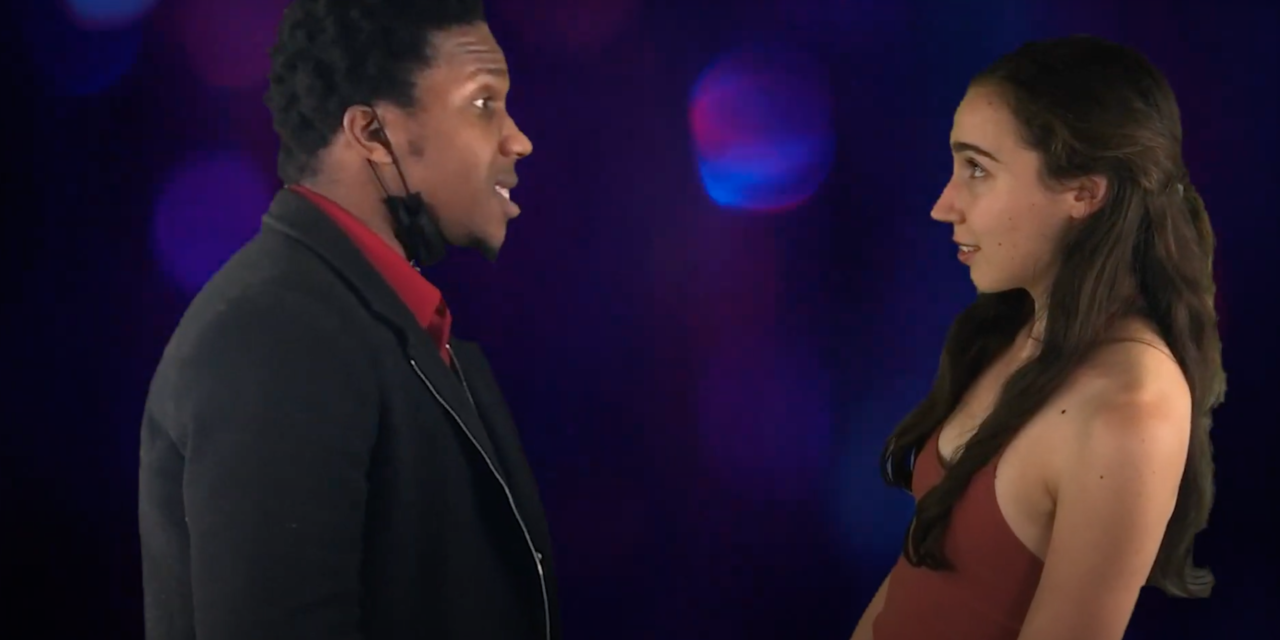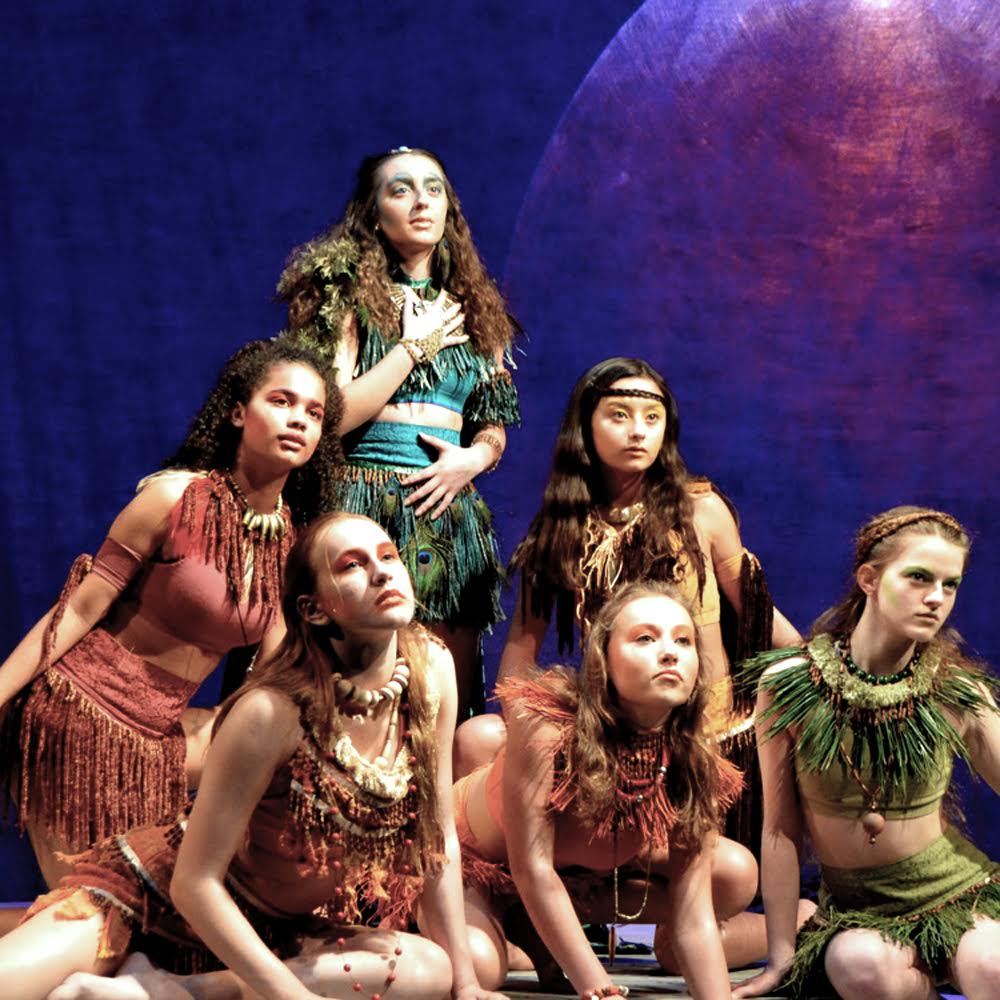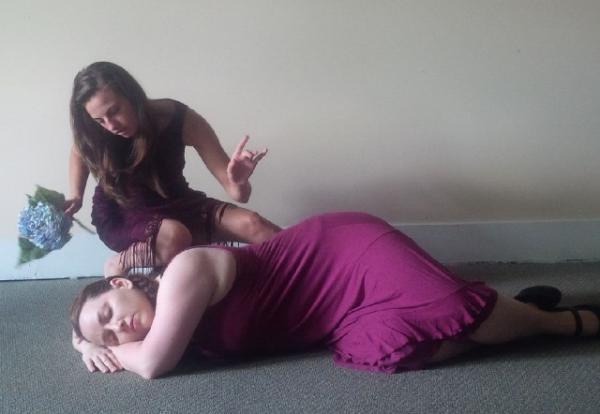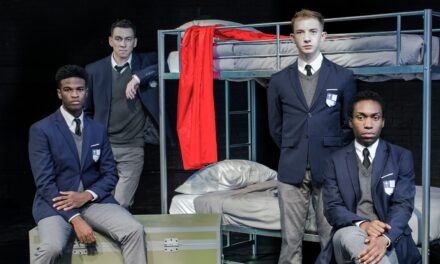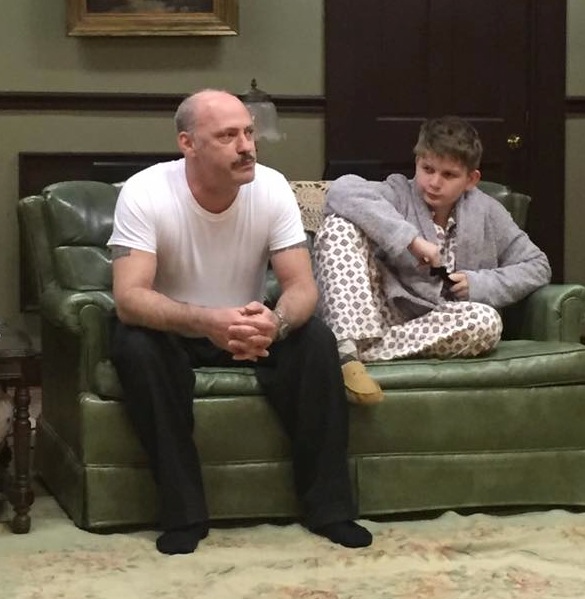Justin Jackson & Avery Deutsch.
Romeo and Juliet Louisville 2020
By William Shakespeare
Directed by Robert Barry Fleming
Dramaturgy by Amy Wegener
A review by Keith Waits
Entire contents are copyright © 2021 by Keith Waits. All rights reserved.
There are productions of Shakespeare that, even when the setting and/or time and place is changed, maintaining fealty to the source, and then there are adaptations that use the text as a departure point for something new. However much it may upset purists, Robert Barry Fleming’s new Romeo and Juliet falls somewhere in between, perhaps leaning a little more towards the latter.
Set in Louisville Kentucky during the May of protesters in the streets and a raging pandemic, this virtual production opens with images of Black Lives Matter marchers in conflict with the police, white militia strapped with automatic weapons, and the Breonna Taylor portrait that stood at the center of the Injustice Park memorial. The conflict of the plot is starkly outlined as racial with white Capulets and black Montagues. It is not in any way subtle but brash and confrontational in its mission.
For the most part, the racial conflict is subtext, but there are moments when Shakespeare’s language nails the concept, as when Tybalt (Alexander Stuart) refers to Romeo thus…” This, by his voice, should be a Montague. Fetch me my rapier, boy. What dares the slave…”
Or when Mercutio responds to being braced by Tybalt: “Consort! what, dost thou make us minstrels? an thou make minstrels of us, look to hear nothing but discords: here’s my fiddlestick; here’s that shall make you dance.”
These lines carry new allusions because of the choice of time and place but most especially the race of the Montagues, and they illustrate once again the universality of The Bard of Avon’s writing. The words can be shaped for many purposes without too much legerdemain.
The conflict between Mercutio and Tybalt is set at Injustice Square, calling to mind the shooting death of Tyler Gerth in June 2020. Rarely has staging a play by Shakespeare in a contemporary setting had such specific reference points.
And just after Romeo, a black man, has killed Tybalt, a white man, Benvolio’s exhortation to flee cannot help but resonate. Will the young black man get a fair shake when the authorities arrive?
The Prince (Eric Sheffer Stevens) comes off as a well-meaning bureaucrat yet clearly a product of white privilege with his humanitarian compassion framed by Ivy League grooming, and the Capulets? Well, Lord Capulet (Chris Henry Coffey) is a convivial yet autocratic alcoholic good ole boy beholden to tradition in spite of the chic, post-Modern home his wealth has provided for Lady Montague (Jennifer Mudge). The ball at which Romeo first lays eyes on Juliet is a Kentucky Derby party and the concept invites additional dialogue: “Have some more bourbon, y’all!”
The filming was accomplished with each actor working separately, and good use of multi-angle backgrounds of Louisville locations in downtown, the parks, and beyond. The artificiality of the merged imagery feels intentional, making a virtue of necessity, although there was a fleeting moment or two when the relationship of two actors within a given space made perfect sense.
The framing and backgrounds sometimes felt at odds with unity of tone and narrative cohesiveness, and the music was occasionally overbearing. The “Queen Mab” speech is shot in fragmented close-ups of Mercutio’s face, most particularly the mouth with a cigar stub jutting out and it struck me as self-conscious and manipulative for uncertain purposes.
And is it also curious that so much more time is spent with the Capulets and the textured rendering of white privilege while the Montagues remain only sketched in characters? Christina Acosta Robinson and Ken Robinson give them dignity and presence but the production short changes the depiction of the Black family except through the vivid actions of its youth. Perhaps that is precisely the point.
Lance Newman II is a bold and irrepressible Mercutio, a character highly conscious of his gift for language that makes sense of casting a celebrated spoken word artist in the role. Another noted local poet, Isaiah Fish brings that same aspect to his Benvolio, even if his palpable queer persona in the role doesn’t entirely overcome his awkwardness as an actor.
In this contemporary context, the Nurse is likely a nanny who has been kept in service longer than strictly necessary, and Jessica Wortham juggles the servant/matriarchal dynamics with the intelligence and skill of a veteran who has played all sides of the Shakespeare roadmap.
Avery Deutsch’s Juliet begins as a callow, self-absorbed girl that dares to be annoying, a product of privilege with no sense of the world outside of her social bubble, swooning during the balcony scene, a glint of mischief in her eye as she flirts with bad boy Romeo. Except Justin Jackson’s Romeo is noble and sincere to the point of banality, but once the relationship deepens they both mature, and the performances steadily track that growth until Romeo embraces the anger and hopeless action that precipitates the tragic conclusion.
Fleming’s Romeo and Juliet Louisville 2020 spotlights how societal norms drive the marginalized to such acts of desperation, and if it does so bluntly, can we imagine that the times demand less? Still, his take also finds room for the voices of women and LGBTQA+ individuals without diminishing the subtextual focus on racial division. That Fleming doesn’t just risk but embraces a production becoming so easily dated is because this Shakespeare speaks to a particular moment and that moment is now.
Featuring Chris Henry Coffey, Avery Deutsch, Isaiah Fish, Devin E. Haqq, Justin jackson, Jennifer Mudge, Lance Newman II, Christina Acosta Robinson, Ken Robinson, Eric Sheffer Stevens, Alexander Stuart, & Jessica Wortham
Romeo and Juliet Louisville 2020
Available through online streaming beginning April 2, 2021
Actors Theatre Direct
Actors Theatre of Louisville
316 West Main Street
Louisville, Kentucky 40202
502- 584-1205
Actorstheatre.org
Keith Waits is a native of Louisville who works at Louisville Visual Art during the days, including being the host of LVA’s Artebella On The Radio on WXOX 97.1 FM / ARTxFM.com, but spends most of his evenings indulging his taste for theatre, music, and visual arts. His work has appeared in LEO Weekly, Pure Uncut Candy, TheatreLouisville, and Louisville Mojo. He is now Managing Editor for Arts-Louisville.com.

